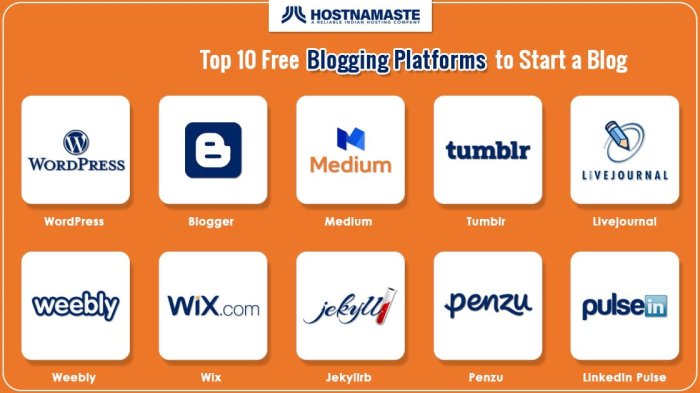Best Blogging Platforms: Ready to dive into the world of blogging? Whether you’re a seasoned blogger or just starting out, choosing the right platform is crucial for your success. Let’s explore the top platforms that can take your blog to the next level.
Introduction to Blogging Platforms

A blogging platform is a software or service that allows individuals to create and manage a blog on the internet. It provides the necessary tools and features to publish content, customize the design, and engage with readers.
Choosing the best platform for your blog is crucial for its success. The right platform can impact the overall user experience, search engine optimization (), and monetization potential of your blog. It is essential to select a platform that aligns with your blogging goals and needs.
The Benefits of Using a Dedicated Blogging Platform
- Professional Appearance: Dedicated blogging platforms offer a variety of templates and customization options to create a professional-looking blog.
- -Friendly: Many blogging platforms are optimized for search engines, making it easier for your content to be discovered by a wider audience.
- Monetization Opportunities: Certain platforms provide built-in tools for monetizing your blog through ads, affiliate marketing, or selling digital products.
- Community and Support: Dedicated platforms often have active communities and support resources to help you grow your blog and troubleshoot any issues that may arise.
Popular Blogging Platforms
When it comes to blogging platforms, there are several popular options that cater to different needs and preferences. Let’s take a look at some of the best-known platforms and their key features.
WordPress
WordPress is one of the most widely used blogging platforms, known for its flexibility and customization options. It offers a wide range of themes and plugins to enhance the functionality of your blog. WordPress is suitable for both beginners and advanced users, with a user-friendly interface and powerful features.
Blogger
Blogger is a free platform owned by Google, making it easy to set up and use. It offers basic blogging features and templates, suitable for beginners looking to start a simple blog. However, it may lack some of the advanced customization options available in other platforms.
Medium
Medium is a popular platform for writers and bloggers looking to reach a larger audience. It focuses on quality content and allows users to follow their favorite writers. Medium offers a clean and minimalist design, making it easy to read and navigate.
Squarespace
Squarespace is a website builder that also offers blogging functionality. It provides a variety of professionally designed templates and customization options. Squarespace is known for its sleek and modern designs, making it a popular choice for bloggers with a focus on aesthetics.
Wix
Wix is another website builder that includes blogging capabilities. It offers a drag-and-drop editor for easy customization and a wide range of templates to choose from. Wix is suitable for beginners looking to create a visually appealing blog without the need for coding skills.
Pricing Comparison
When it comes to pricing, WordPress offers a free version with the option to upgrade to a paid plan for more features and customization. Blogger is free to use, while Medium allows users to read and publish a limited number of articles for free. Squarespace and Wix offer paid plans with different pricing tiers based on the features and storage options you need.
User-Friendly Platforms
When it comes to blogging, having a user-friendly platform can make all the difference. Here are some popular options known for their ease of use for beginners.
WordPress
- WordPress is one of the most popular blogging platforms, known for its user-friendly interface.
- Beginners can easily navigate through the dashboard and customize their blog with just a few clicks.
- WordPress offers a wide range of customizable templates and layouts to choose from, making it easy to create a unique look for your blog.
Wix
- Wix is another user-friendly platform that is perfect for beginners looking to start a blog.
- The drag-and-drop editor makes it simple to design your blog without any coding knowledge.
- Wix also provides a variety of customizable templates and layouts to help you create a professional-looking blog in no time.
Squarespace
- Squarespace is known for its sleek and modern designs, perfect for bloggers who want a visually appealing site.
- The platform offers easy-to-use customization options, allowing beginners to personalize their blog with ease.
- Squarespace provides a range of customizable templates and layouts that can be easily tailored to fit your style and branding.
Capabilities
When it comes to running a successful blog, (Search Engine Optimization) plays a crucial role in driving traffic to your site and increasing visibility. helps your blog rank higher in search engine results, making it easier for users to find your content. Different blogging platforms offer various tools and features to help you optimize your blog for search engines. Let’s dive into how different platforms support optimization and provide tips for maximizing benefits on popular platforms.
WordPress
- WordPress is known for its strong capabilities, with built-in features such as customizable permalinks, sitemap generation, and plugins like Yoast .
- Ensure to optimize your content with relevant s, meta descriptions, and alt text for images to improve your blog’s on WordPress.
- Regularly update your plugins and themes to ensure they are -friendly and comply with the latest search engine algorithms.
Blogger
- While Blogger is user-friendly, it lacks some advanced features compared to platforms like WordPress.
- Focus on creating high-quality content with proper headings, meta tags, and image optimization to improve on Blogger.
- Utilize external tools like Google Search Console to monitor your blog’s performance and make necessary adjustments.
Wix
- Wix offers tools like meta tags, customized URLs, and mobile optimization to enhance your blog’s visibility on search engines.
- Regularly update your blog content, optimize images, and use relevant s to improve on Wix.
- Utilize Wix’s Wiz tool to analyze your blog’s performance and receive personalized recommendations for optimization.
Monetization Options

Making money from your blog is a dream for many aspiring bloggers. There are various ways to monetize your content, and some platforms even offer built-in options to help you earn from your posts. Let’s explore the different monetization options available to bloggers and highlight some success stories in the blogging world.
Ad Placement
- One popular way bloggers monetize their content is through ad placement. By displaying ads on their blog, bloggers can earn revenue based on the number of clicks or impressions the ads receive.
- Platforms like WordPress and Blogger allow bloggers to easily integrate ad networks like Google AdSense to start earning from their content.
- Successful bloggers like Michelle Schroeder-Gardner of Making Sense of Cents have made a significant income through ad placements on their blogs.
Affiliate Marketing
- Another common monetization option for bloggers is affiliate marketing. By promoting products or services and earning a commission for every sale or lead generated through their unique affiliate link, bloggers can generate passive income.
- Blogging platforms like Wix and Squarespace offer built-in features to easily incorporate affiliate links into blog posts.
- Pat Flynn from Smart Passive Income is a prime example of a blogger who has mastered affiliate marketing to generate a substantial income from his blog.
Sponsored Content, Best Blogging Platforms
- Bloggers can also monetize their content by partnering with brands for sponsored content. Brands pay bloggers to create posts that promote their products or services, reaching the blogger’s audience.
- Platforms like Medium and Tumblr provide opportunities for bloggers to connect with brands for sponsored content collaborations.
- Influential bloggers like Chiara Ferragni of The Blonde Salad have built successful careers by collaborating with brands for sponsored content on their blogs.
Mobile Responsiveness
In today’s digital age, having a mobile-friendly blog is crucial for reaching a wider audience and ensuring a positive user experience. With more and more people accessing the internet through their smartphones and tablets, a responsive design that adapts to different screen sizes is essential for the success of a blog.
When it comes to different blogging platforms, they vary in how they handle mobile responsiveness. Some platforms offer built-in responsive themes that automatically adjust the layout based on the device being used, while others may require manual adjustments or the use of third-party plugins to achieve the same effect.
Optimizing for Mobile Viewing
- Choose a responsive theme: Select a theme that is mobile-friendly and adjusts seamlessly to different screen sizes.
- Optimize images: Compress images to reduce loading times on mobile devices.
- Simplify design: Avoid cluttered layouts and excessive elements that may not translate well to smaller screens.
- Test on different devices: Ensure your blog looks and functions well on various mobile devices to provide a consistent user experience.
- Use readable fonts: Opt for fonts that are easy to read on smaller screens to enhance readability.
Content Management Systems (CMS): Best Blogging Platforms
Content Management Systems (CMS) are software applications that help users create, manage, and modify digital content on a website without the need for specialized technical knowledge. In the context of blogging platforms, a reliable CMS plays a crucial role in providing users with the tools and features necessary to publish and organize their blog posts effectively.
Popular CMS Used in Blogging Platforms
- WordPress: WordPress is one of the most widely used CMS for blogging platforms due to its flexibility, user-friendly interface, and extensive plugin options.
- Joomla: Joomla is another popular CMS known for its robust features and scalability, making it suitable for bloggers with more complex website needs.
- Drupal: Drupal is a powerful CMS that offers advanced customization options, making it ideal for bloggers looking for a highly customizable platform.
Importance of Reliable CMS for Bloggers
A reliable CMS is essential for bloggers as it ensures a seamless blogging experience, efficient content management, and easy customization of their websites.
- Organization: A good CMS helps bloggers organize their content effectively, making it easier for readers to navigate through the website and discover relevant posts.
- Optimization: Many CMS platforms offer built-in tools that help bloggers optimize their content for search engines, improving visibility and driving more traffic to their blogs.
- Security: A reliable CMS ensures that bloggers’ websites are secure from potential threats, protecting valuable content and user information from cyber attacks.